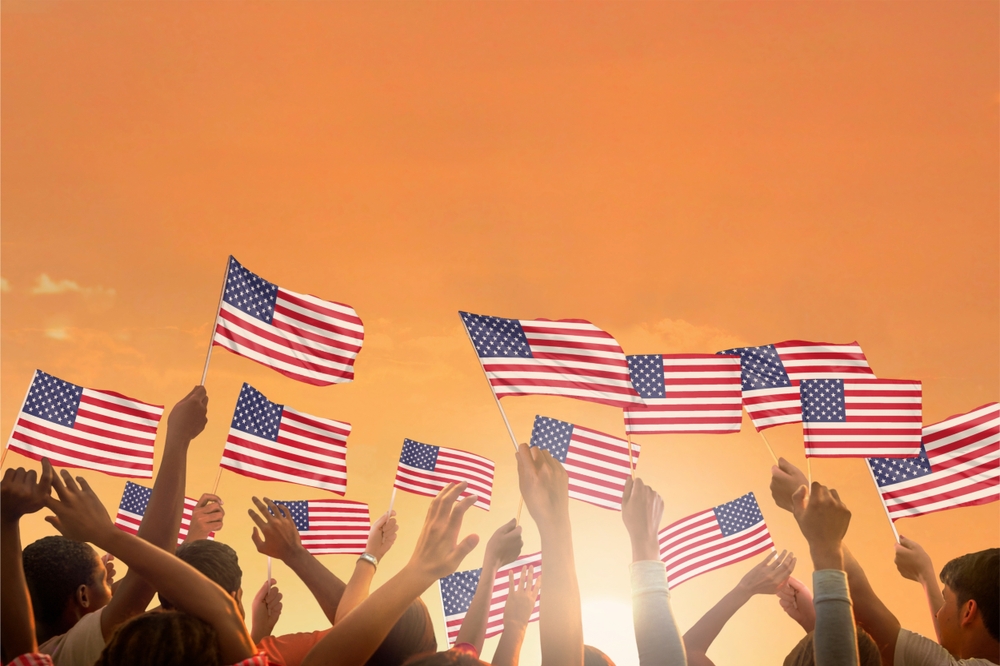The winds of change are whispering truths about American culture that we can no longer ignore. As we evolve, certain aspects of our once emblematic ways now seem like relics from an outdated, awkward scrapbook. Whether you’re sipping your morning coffee or doomscrolling late at night, these cultural quirks might just make you pause. Let’s dive into the 13 things that, when you think about it, might make you cringe just a little.
1. The Outdated Education System

Our education system feels like a relic of the past, designed in a world that no longer exists. The emphasis on rote memorization and standardized testing seems out of touch with the skills needed in today’s dynamic environment. We’re preparing kids for a future that demands creativity, critical thinking, and adaptability, yet our schools are stuck in an old paradigm. It’s becoming painfully clear that education needs a revolution, not just a facelift.
Imagine classrooms that foster innovation and nurture diverse talents instead of ranking students arbitrarily. Education should be a bridge to the future, not a shadow of the past. It’s time to question and dismantle systems that no longer serve our children. The future awaits those willing to learn and evolve beyond traditional constraints.
2. The Misguided Notion Of American Exceptionalism

American exceptionalism is a narrative that’s losing its luster as global realities collide with national myths. The belief that America is inherently superior feels increasingly out of touch in an interconnected world. While pride in one’s country is natural, the arrogance of exceptionalism has cost us allies and credibility. It’s a narrative that blinds us to our faults and limits our ability to learn from others.
Recognizing our flaws doesn’t diminish our worth; it enhances our growth. There’s strength in humility and wisdom in acknowledging that we have much to learn. Let’s celebrate America not for its perceived superiority but for its potential to be a constructive member of the global community. The world doesn’t need another exceptional nation but a cooperative one.
3. The Worship of Hustle Culture

You know the drill: sleep is for the weak, coffee is your blood type, and there’s always another mountain to climb. Yet, what once seemed like the American dream now feels like a collective nightmare. We’re slowly waking up to the fact that hustling non-stop isn’t the badge of honor it used to be. A 2019 study by the World Health Organization even highlighted how long working hours can lead to a higher risk of stroke and heart disease, shedding light on the true cost of constant busyness.
Instead of being a shiny emblem of ambition, hustle culture is now seen as a ticket to burnout. In a world that glorifies the grind, the concept of rest feels downright revolutionary. You’re not lazy for wanting balance; you’re human. And maybe it’s time to reclaim our evenings, our weekends, and our sanity.
4. The Obsession With Youth (And Plastic Surgery)

We’ve always been a nation that glorifies youth, but it’s starting to feel more like an unhealthy fixation. From skin-care aisles to Hollywood screens, the chase for eternal youth is relentless and, let’s be honest, exhausting. Why should the prime of life be squeezed into such a narrow window? As we age, there’s wisdom, grace, and a depth that fresh faces simply can’t replicate.
It’s time to start valuing the lines that tell stories and the silver strands that signal experience. The industry of anti-aging isn’t just selling products; it’s selling the idea that growing older is a crime. Let’s look forward to the years that add layers to our identities, not strip them away. Embracing age is an act of rebellion in a culture obsessed with wrinkle-free perfection.
5. The Obsession With Fast Food

In the land of the drive-thru, the golden arches are as American as apple pie—or perhaps more so. Fast food may have been the fast fix for busy families, but the true cost is showing up in our waistlines and health reports. A 2020 report from the Journal of the Academy of Nutrition and Dietetics revealed the correlation between fast food consumption and rising obesity rates in the U.S. This shouldn’t come as a shock, but it’s an unflattering truth many have ignored for too long.
Convenience is seductive, but at what price? Our palates crave real, nourishing food that doesn’t sacrifice quality for speed. Fast food isn’t just an unhealthy habit; it’s a symbol of a rushed society that needs to slow down. Re-evaluating our relationship with food might just be the key to healthier communities.
6. The Idolization Of Celebrities

We’ve built altars to the stars, and not the celestial kind. Our culture’s infatuation with celebrity will have future generations shaking their heads in bewilderment. While admiration is one thing, the pedestal we’ve placed celebrities on is vertigo-inducing. Their lives are dissected in excruciating detail, as if their actions have deeper implications for our own.
But what if we shifted the spotlight to those who are truly making a difference? The teachers, the scientists, the activists—those who impact lives in meaningful ways. Elevating the fame game to such heights diminishes the real heroes among us. It’s time to redirect our gaze onto the everyday people transforming the world.
7. The Celebration of Lone Cowboys

The lone cowboy, the self-made man—these are the images deeply ingrained in the American psyche. Rugged individualism has been romanticized to the point where asking for help is seen as weakness. But in reality, there’s more strength in community and collaboration than in solo acts. Psychologist Dr. Susan Pinker notes that social integration is crucial for both mental and physical health, a point often overlooked in our pursuit of solitary success.
Individualism isn’t inherently bad, but taken to extremes, it isolates us in echo chambers. When every man is an island, we miss out on the collective support networks that enrich our lives. True growth often comes from shared experiences, from leaning on others and letting them lean on you. Maybe it’s time to trade in our cowboy boots for some team sneakers.
8. The Spectacle Of Excess

American culture has long been synonymous with excess, from mega-mansions to supersized meals. But as the planet groans under the weight of our consumption, the excess feels less like luxury and more like gluttony. The pursuit of more has led to a depletion of resources and an increase in waste that’s hard to justify. In a world of limits, the American appetite for excess is becoming more embarrassing than enviable.
What if the true mark of success was not how much we have, but how little we need? Simplicity and sustainability could be the new status symbols in a world craving change. Cultivating a consciousness around consumption is a step toward a more balanced existence. Let’s redefine luxury as living with intention and care for the world we inhabit.
9. The Romanticizing Of The Wild West

The Wild West, with its cowboys and outlaws, might have seemed an adventurous spectacle from a distance. But peel back the layers, and it’s a history filled with violence, colonization, and the displacement of Native peoples. Historian Richard White points out that the West was less about individualism and more about government intervention and law enforcement. Our romantic narratives conveniently overlook the darker truths that still echo today.
It’s time to reexamine the myths we tell ourselves and the stories we pass down. The allure of the Wild West is fading as we recognize its real history. Celebrating a past steeped in inequality and injustice isn’t something we should be proud of. Let’s focus on narratives that honor truth over nostalgia.
10. The Stigma Around Mental Health

For too long, mental health issues have been whispered about in shame and secrecy. We’ve crafted a culture where suffering in silence is seen as a virtue, not a cry for help. The tides are changing, but there’s still a long way to go before mental health is given the same dignity as physical health. Our reluctance to openly discuss these issues has kept too many people from seeking the support they need.
Imagine a world where therapy appointments are as routine as physical check-ups. Opening the dialogue around mental health is not just healing; it’s necessary. It’s about time we demolish the stigma and embrace vulnerability as strength. Conversations that normalize mental health can pave the way for a more empathetic future.
11. The Cult Of Consumerism

From Black Friday frenzies to shopping as therapy, consumerism is woven into the fabric of American life. But as closets overflow and credit card bills stack up, the allure of material possessions is starting to wane. We’re waking up to the fact that buying more stuff doesn’t equate to more happiness. It often leads to a cycle of dissatisfaction and debt.
Consumerism is a band-aid, a temporary fix for deeper issues of identity and belonging. What if we channeled the time and energy spent on acquiring things into nurturing relationships and experiences? Let’s value what truly enriches us and question the culture that equates worth with wealth. There’s freedom in choosing fulfillment over accumulation.
12. The Denial Of Climate Change

For years, climate change denial has been the embarrassing uncle at the family reunion we all wish would just sit down and listen. It’s a cultural blind spot that’s baffling in its persistence, as if ignorance could somehow shield us from reality. As wildfires rage and sea levels rise, the stakes have never been higher. Denial isn’t just embarrassing; it’s dangerous.
Acknowledging climate change is a crucial step in forging actionable solutions. Pretending it’s a hoax or an exaggeration won’t stop the inevitable repercussions. It’s time to embrace science and innovation as allies in the fight for our planet’s future. Turning a blind eye is no longer an option we can afford.
13. The Fetishization Of Productivity

Being busy has become a status symbol, as if our worth is directly tied to our output. This obsession with productivity leaves little room for leisure, reflection, or just existing without a checklist. The relentless push to constantly do more is not only exhausting but also unfulfilling. Society’s fixation on productivity is starting to feel more like a hamster wheel than a pathway to progress.
Could it be that we’re missing out on the essence of life by equating busyness with success? It’s time to redefine what it means to be productive, valuing quality over quantity. Let’s embrace the idea that rest is not wasted time, but an essential part of the cycle. In slowing down, we might just find we can move forward with more intention and joy.
Natasha is a seasoned lifestyle journalist and editor based in New York City. Originally from Sydney, during a stellar two-decade career, she has reported on the latest lifestyle news and trends for major media brands including Elle and Grazia.


